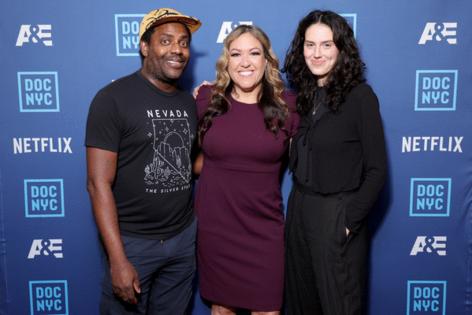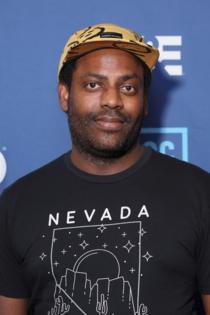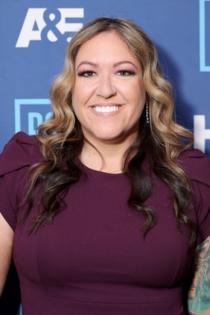Have anxiety? So do these comedians. Here are the strategies that help them cope
Published in Lifestyles
LOS ANGELES -- "If you don't have anxiety," stand-up comedian Aparna Nancherla riffs onstage, "the way I would describe it is there's, like, an edgy improv group in your brain and it just needs a one-word suggestion to spin, like, countless scenarios that no one's comfortable with."
Nancherla's candor about this life experience is how she landed in "Anxiety Club," a new documentary on the streaming platform Jolt. The film dives into the topic of anxiety, taking an up-close and often uncomfortable look at how it manifests, what it feels like in the body and the brain and ways to cope — all from the point of view of working comedians. It follows Nancherla as well as Tiffany Jenkins, Mark Normand, Joe List, Marc Maron, Baron Vaughn and Eva Victor both on and off the stage as they navigate writing and performing comedy, dating and marriage, caring for young children and counseling friends who also have anxiety.
Anxiety affects more than 300 million people globally, according to the World Health Organization. Filmmaker Wendy Lobel says she's struggled with anxiety most of her adult life and wanted to make a movie about the topic that would disarm viewers with humor to help promote understanding and healing.
"I think for people to be able to engage with this subject — whether they have anxiety or love someone with it — it's easier when it's packaged through comedy," Lobel says.
Despite popular perception, comedians don't necessarily suffer more from anxiety than the general population, says clinical psychologist Ildiko Tabori, who specializes in the treatment of comedians. But they are uniquely qualified to communicate the anxious experience, she says.
"Comedians are spokespeople for society," Tabori says. "They are essentially our reality check, conveying real-world experiences, with a funny bent, and putting it on a stage where you can connect with them."
In the film, Tabori adds, "These comedians will show that you can continue to function, even with your anxiety. You can continue to perform, you can live your life. And you can use it to your benefit as opposed to having it hold you hostage from doing the things that you want to achieve in life."
We spoke to four of the comedians in the film who offered personal anecdotes and advice for coping with anxiety.
This interview has been lightly edited for length and clarity.
Tiffany Jenkins
Co-host of "Take It or Leave It" and "The Tiff & Flip Show" podcasts and author, most recently, of "A Clean Mess"
How long have you struggled with anxiety?
When I was a kid, I was worried about stuff most other kids my age weren't worried about. I would be afraid that my parents were going to die all the time, so I would say I love you 100 times to them. I was afraid I was gonna hurt myself on the playground, so I would sit it out because I didn't want to get hurt and have a hospital bill because I knew we couldn't afford it. I was worried about everything.
How has it manifested in your adult life? Can you share an experience?
I have multiple forms of anxiety, [including] generalized anxiety disorder and social anxiety. It was destroying my kids' childhood. They're 9 and 10 years old now. It made it so that they couldn't do anything fun. Like, my voice shouting out cautions to them was the soundtrack of their childhood. They weren't allowed to play on anything that was high up in the air. They weren't allowed to go out front and play near the street because there were cars. It got to a point where the family would leave me at home because I would ruin every fun event.
What strategies have helped you cope with your anxiety?
Medicine and therapy, absolutely. I do a lot of breathing exercises. Those are good in the moment when I'm having a mini attack of panic. Doing box breathing really works for me. That's where you imagine a box in your mind, and while you're going across the top of it you're breathing in for four seconds, then you go down the right side and you hold it four seconds. Then you go along the bottom and you exhale for four seconds. Then you go up and you hold the exhale for four seconds. I also do a lot of guided meditations on YouTube. They're free, and you just look up "guided meditation for excessive worry" or "guided meditation for sleep." But exposure therapy — being exposed to your fears over and over again until they no longer have a power over you — changed my life. It changed my children's lives. It was the most traumatizing thing I've ever been through, but it was the most rewarding thing once it was finished.
Has working in the entertainment industry aggravated your anxiety, or does performing comedy provide an outlet?
I have terrible stage fright and I am always worried about disappointing people. So every time before I go out onstage, I feel like I'm gonna throw up and pee my pants, and I have to meditate and sniff incense and hold a crystal in my hand just so I can make it through. But on the other side, it's always so worth it once I do it.
Do you have a joke about anxiety or a funny story to share?
I do this joke. I would ask the audience, "Who all has anxiety?" and nearly everybody would raise their hand. And then I would say, "How many of you are addicted to true crime?" and then everybody raises their hand again. And I'm, like, "What is wrong with us? Why are we like this?!"
Joe List
Host of "Mindful Metal Jacket" podcast, co-host of "Tuesdays With Stories" podcast and director of the documentary, "Tom Dustin: Portrait of a Comedian"
How long have you struggled with anxiety?
I remember getting dropped off at kindergarten and, like, sobbing and not wanting to go. Now I'd look back and be like, "Oh, that was anxiety."
How has it manifested in your adult life? Can you share an experience?
About seven years ago, leading up to my getting married, I went to a dentist because I was having dental pain. I couldn't put my finger on which tooth it was. I was like: "Do I need a root canal? Can you take a tooth out? Something's wrong." My dentist looked at it, examined it, took X-rays and was like: "You need a therapist, not a dentist.'" It was all just anxiety and stress manifesting for me as dental pain. I had that a lot — all my anxiety manifested in physical things. Kidney pains, chest pain, headaches.
What strategies have helped you cope with your anxiety?
Meditation has been the biggest thing for me. I use the Waking Up app, which is a great meditation app that [neuroscientist] Sam Harris runs. He does a daily 10-minute meditation, but it also has loving-kindness meditations, cognitive behavioral therapy. It's been the biggest game changer in my mental health battle. As well as [talking] therapy — I've been going to the same therapist for eight years. I also do breathing exercises, like alternate nostril breathing and straw breathing, where you breathe in through your nose and out through a small hole in your mouth as if you have a straw there. It's a longer exhale than inhale.
Has working in the entertainment industry aggravated your anxiety , or does performing comedy provide an outlet?
I never had any performance anxiety. Going onstage is quite comforting for me and therapeutic. I always feel great after I go onstage and in control. But the business side of it is definitely anxiety [producing]. Social media adds a lot of stress and anxiety — it's such a huge part of the job. And people have access to you. All day they're messaging you: "Your teeth look horrible" or "Your wife is too hot for you." There's not a day where some stranger does not write to me, "You suck."
Do you have a joke about anxiety or a funny story to share?
I've read that the average human has 10,000 thoughts a day. I feel like I have three thoughts a day, just repeating 10,000 times. You're not funny. Is that cancer? My parents are gonna die. Those are my three thoughts.
Baron Vaughn
Co-host/co-creator of "The New Negroes" on Comedy Central and BET, as well as former series regular on Netflix's "Grace & Frankie"
How long have you struggled with anxiety?
It's almost like you're asking me: "At what point did you realize you were speaking English?" I wasn't conscious that that's what I was feeling until later in life, when I acquired the language to describe the experience. When you're younger, there is this false idea that you are the only one that's experiencing this thing. There's almost a fear of talking about it. As I got older — listening to people, reading books, talking to friends — little by little I came to understand the definition that fit my experiences was anxiety.
How has it manifested in your adult life? Can you share an experience?
I have all the anxieties, including social anxiety. I used to live in L.A., and if I was invited to go somewhere and I drove there and it took me longer than 15 minutes to find parking, I would leave. I am no longer going to this thing, it's too much! My heart would start pounding. I'd be hyperventilating. You're missing out on friendships, and it's shrinking social circles. Because if people invite you somewhere and you don't show up, eventually they stop inviting you.
What strategies have helped you cope with your anxiety?
Therapy. Specifically, somatic experiencing. It's a type of therapy — unlike talk therapy which is a little more about analysis — that is based on the premise that we know our emotional experiences have a physical manifestation. So what if we address the physical manifestation first? We start there, get comfortable in our own skin. It's really about central nervous system regulation. Getting to neutral.
Has working in the entertainment industry aggravated your anxiety , or does performing comedy provide an outlet?
The outlet part of [performing comedy] is master storytelling. Being able to express these things, it lets me have some sort of agency or ownership over it. But I get nervous every single time I go onstage. I look around and decide who's gonna hate me in the audience.
Do you have a joke about anxiety or a funny story to share?
If I show up at a party, what I do is I go as far inside the party as I can — basically to the back of the party. And once I reach that place, I turn around and start saying goodnight to everybody as I leave. I've done it in 10 minutes!
Opeyemi Olagbaju
A regular on CBS' "After Midnight" and featured on Hulu's "This Fool"
How long have you struggled with anxiety?
I probably had it as a kid. But I remember when I realized I really had it bad was when an ex-girlfriend told me, "Before shows, you get really antsy. You have this energy that's scattered and you walk around really tense." And I realized she was right.
How has it manifested in your adult life? Can you share an experience?
I can't go over bridges. I'm afraid of bridges. So if I see a really big bridge, like the bridge in Long Beach, going over that terrifies me. I just take the long way around. A bridge that high? I'm like: "Nah, I'm not doing that!" I wish Google Maps had an "avoid bridges" option instead of highways.
What strategies have helped you cope with your anxiety?
I meditate. Especially before a big show or if I'm headlining a show out of town. I have an app that I use — it's called Happier — and I do guided meditations. Bridges? I just avoid them. I also do therapy, I see someone once a week. I exercise too. I go to the gym three to four times a week. If I know I'm gonna be in a high-stress situation later, I will go exercise just to make sure I'm more calm and my brain doesn't ramp up. Also, calling your friends who understand what you're going through helps.
Has working in the entertainment industry aggravated your anxiety , or does performing comedy provide an outlet?
It's both. In comedy, you run into different kinds of people — some are great and some are awful. Everyone's just dealing with their thing. And sometimes in the midst of dealing with their thing, it clashes with your thing. So there are certain individuals who create more anxiety working with them. But there are people who are amazing.
Do you have a joke about anxiety or a funny story to share?I don't really have a funny story outside of: I don't go on bridges!
©2025 Los Angeles Times. Visit at latimes.com. Distributed by Tribune Content Agency, LLC.





























Comments